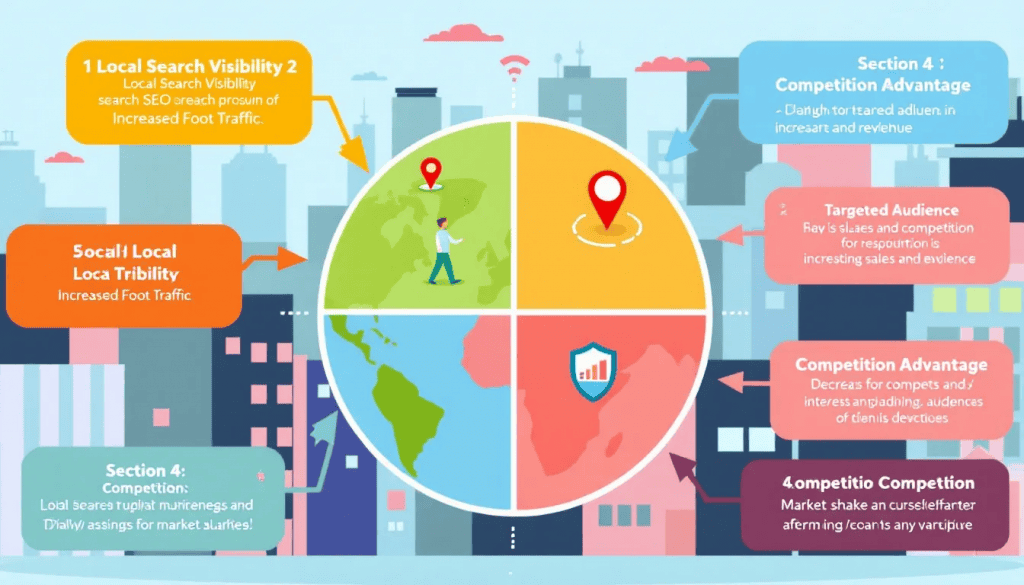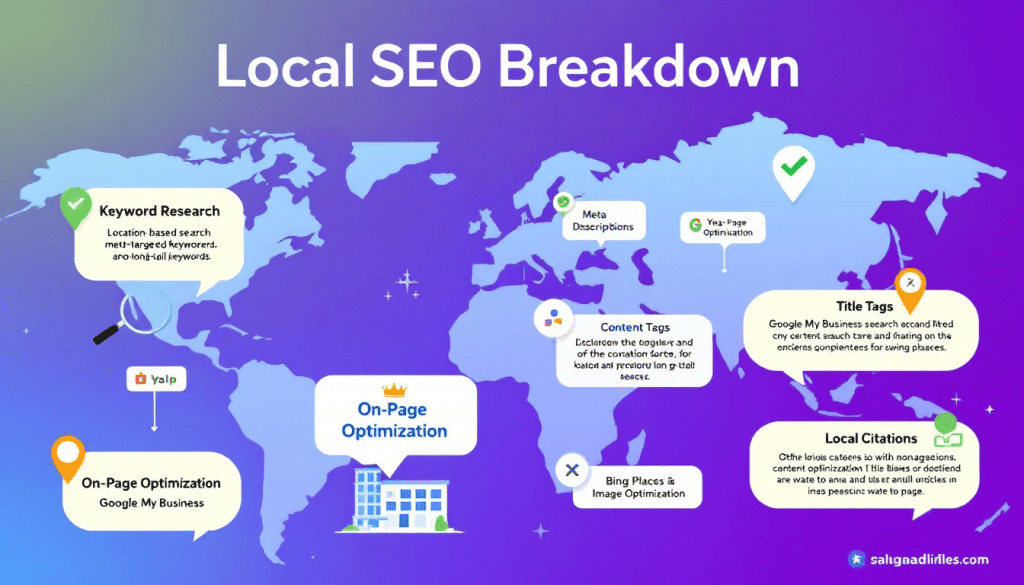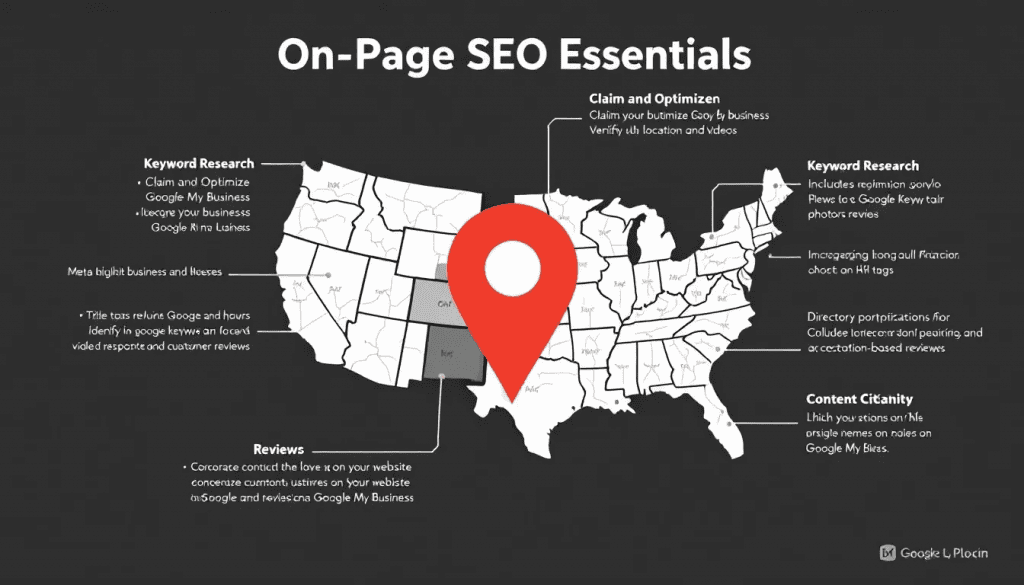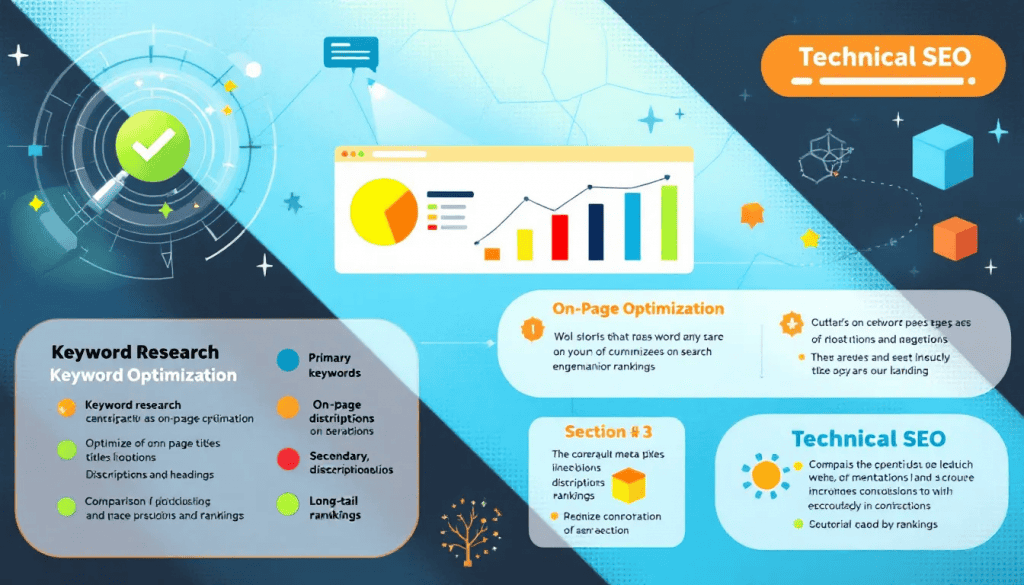Local search engine optimization (SEO) is a digital marketing strategy focused on improving a business’s visibility in local search results. It aims to attract customers in specific geographical areas by optimizing online presence. This is crucial for businesses like restaurants, retail stores, and service providers. This article will break down the key components of what is local search engine optimization and provide actionable tips to master it.
Key Takeaways
- Local SEO enhances online visibility for businesses targeting customers in specific geographical areas, particularly through ‘near me’ searches.
- Key strategies for mastering Local SEO include optimizing Google Business Profiles, managing online reviews, and conducting local keyword research.
- Effective Local SEO practices not only improve search rankings but also enable smaller businesses to compete with larger companies in their local markets.
What Is Local Search Engine Optimization and How to Master It

Local SEO is an essential marketing strategy tailored for enhancing the visibility of a website within local search results. It diverges from standard SEO by concentrating on drawing customers who are searching locally for products or services in a particular area, proving particularly advantageous to businesses like shops, eateries, and various service providers with actual establishments.
The prominence of Local SEO has increased considerably due to the rise of searches including “near me” on mobile devices. Search engines such as Google prefer featuring businesses geographically proximate and pertinent to the searcher’s needs when there are queries about local services. The coveted ‘local SEO 3-pack’ section emerges here, presenting the leading three businesses relevant to these localized inquiries.
Implementing successful Local SEO encompasses a range of tactics aimed at bolstering a business’s ranking in unpaid search outcomes that are specific to location. Vital components include optimizing one’s Google Business Profile, curating online reviews positively, and conducting research focused on local keywords. These actions assist search engines like Google in discerning both what services or products a business offers and where it operates—enhancing its position within local search rankings.
For any enterprise looking to capture attention from nearby clients effectively through their marketing strategy understands that harnessing Local SEO is imperative—not simply optional. A robustly crafted local SEO strategy equips smaller players with opportunities to contend against larger rivals while increasing visibility among potential customers right in their vicinity.
Introduction
Local search engine optimization is a crucial strategy for local businesses aiming to boost their visibility among local search results. This tactic is designed to attract more regional customers by optimizing web pages, increasing both online traffic and in-store visits, ultimately contributing to higher sales figures.
Incorporating local keywords effectively can significantly enhance the discoverability of a business within the digital space, emphasizing the necessity for comprehensive Local SEO tactics by owners of such enterprises. The presentation of a company’s online persona should succinctly convey what sets it apart from others, detailing its distinctive offerings and compelling reasons for customer preference.
This article delves into several aspects of effective Local SEO and offers practical guidance on how to excel at boosting your presence within the realm of localized searches.
Understanding Local Search Engine Optimization
Local SEO constitutes a strategic method in digital marketing, focusing on boosting a website’s visibility within the search results pertinent to a specific locality. It is of particular advantage for local enterprises like eateries and various service providers as it draws customers from the surrounding area. When conducting local searches, individuals often employ terms such as “near me” or “in [city],” necessitating customized SEO strategies.
Integral to Local SEO is fine-tuning different elements that can enhance a business’s placement in local search outcomes.
The principal determinants affecting positions in local search include:
- Proximity: The spatial distance between the searcher and the business.
- Relevance: The extent to which a business satisfies what is being sought after.
- Prominence: How well-known and regarded the establishment is locally?
Refining Local SEO encompasses management of localized listings with accurate NAP (Name, Address, Phone number) details while actively engaging with members within one’s community precincts. Concentrating on these areas empowers businesses to elevate their stature amidst local searches thereby alluring an increased customer base hailing from nearby vicinities.
Importance of Local SEO for Businesses

Local SEO is vital for businesses aiming to thrive in their local markets. Enhanced online visibility makes it easier for potential customers to discover a business, leading to increased foot traffic for physical stores. Greater visibility through Local SEO ensures a business targets web traffic that is more likely to convert into sales.
Statistics highlight the significance of Local SEO: approximately 46% of all Google searches are looking for local information. Post-pandemic trends have shown that over half of consumers prefer to shop locally, reinforcing the critical nature of Local SEO. Effective Local SEO practices not only help businesses rank higher in local search results but also establish them as thought leaders within their community.
Moreover, Local SEO allows smaller businesses to compete with larger, established companies. By implementing a solid Local SEO strategy, local businesses can level the playing field and attract more local customers, making Local SEO an essential component of any business’s online marketing efforts.
Key Elements of Local SEO

For businesses aiming to excel in local search results, it’s imperative to concentrate on key aspects of Local SEO. This involves refining their Google Business Profile, undertaking detailed keyword research targeted at the local market, and maintaining a positive presence through the management of online reviews. The efficacy of these elements is paramount for improving a business’s prominence within local searches.
By optimizing the Google Business Profile, companies elevate their chances to feature prominently in Google’s localized 3-pack listings—a key area that can attract more local customers. Tailoring content with locality-specific keywords ensures greater relevance and resonance with a regional audience while actively engaging with customer feedback via online reviews not only garners trust but also significantly boosts rankings within local search parameters.
Google Business Profile Optimization
Enhancing a business’s presence within local search results hinges on the optimization of their Google Business Profile. This vital process involves claiming and verifying your profile, ensuring all details are meticulously accurate, and furnishing every aspect of the profile thoroughly. The confirmation of your physical location is an essential component for Google My Business enhancement as it aids in authenticating the establishment’s credibility.
Incorporating professional-grade images that showcase the store, employees, and products can markedly bolster how inviting your Google Business Profile appears. Visuals afford potential customers deeper insights into what a company represents and its services or goods, heightening prospects for customer engagement. Keeping information current with consistent updates about news and promotions also contributes to keeping the profile dynamic, which captures interest.
A finely tuned Google Business Profile yields improved placement in local search listings as well as visibility on Google Maps — pivotal factors that increase phone inquiries and foot traffic from prospective clients. Responding to reviews left by patrons fosters trustworthiness while simultaneously affecting how prominently a business features across searches on Google.
Local Keyword Research
The foundation of an effective local SEO strategy is grounded in thorough keyword research targeting the community level. It requires pinpointing keywords that resonate with what potential customers are entering into search queries when seeking products or services within a given locale. Emphasis is placed on long-tail keywords – those which are more specific and intimately connected to both the business offerings and their geographical context.
Utilizing resources such as Google’s Keyword Planner and Semrush’s Keyword Gap tool can greatly assist in uncovering important local keywords for your campaign. Leveraging Google Autocomplete by inputting location-centric terms can yield beneficial long-tail keyword suggestions. Embedding these locally relevant keywords seamlessly into the website’s narrative elevates its appeal to nearby audiences while boosting its position in local search results.
Achieving precision in identifying appropriate local keywords proves pivotal, influencing how potent a Local SEO effort will be. By honing in on precise terms used by consumers at a regional level, businesses attract qualified leads that are far more likely to convert upon reaching their site. This makes mastering comprehensive keyword research indispensable for successful optimization within localized searches.
Online Reviews Management
Managing online reviews is a critical aspect of Local SEO. Customer reviews on platforms like Google and Yelp significantly impact local search rankings and consumer trust. Positive reviews can enhance a business’s reputation, while negative reviews, if managed well, can demonstrate a business’s commitment to customer satisfaction.
Businesses should respond to all reviews within two days to show that they value customer feedback. Engaging with reviews, both positive and negative, builds trust and supports Local SEO efforts. A diverse range of reviews contributes to the authenticity of a business’s online presence.
Active management of online reviews improves visibility in local search results and attracts more customers. Responding to reviews on Google My Business also helps address negative feedback effectively and shows potential customers that the business cares about their experience.
On-Page SEO for Local Search

Optimizing a website’s on-page SEO elements is crucial for enhancing its local search rankings. This includes adjusting the site’s title tags, meta descriptions, and content to correspond with the kinds of searches local customers are making. By adding structured data markup to your website, you provide search engines with clear information about your business, which can improve how it appears in search results.
It’s equally important for websites to be optimized for mobile users since a vast majority of local searches are conducted on mobile devices. When these aspects of on-page SEO are effectively managed, they lead to better visibility in local search engine results and help draw more local customers searching for relevant products or services.
Optimizing Title Tags and Meta Descriptions
Optimizing title tags and meta descriptions is a key aspect of on-page SEO for Local SEO. Title tags should include primary keywords and location within the character limit to improve visibility in search results. Meta descriptions should also be optimized with locally relevant keywords to enhance click-through rates.
By effectively optimizing these elements, businesses can improve their local search rankings and attract more local customers. This practice ensures that the website appears relevant and appealing to both search engines and users.
Creating Location-Specific Content
Incorporating content that caters specifically to a local audience is paramount for boosting engagement and climbing higher in local search rankings. Crafting comprehensive guides that highlight neighborhood hotspots, significant landmarks, or area-specific events can prove beneficial. Including testimonials from satisfied customers and localized case studies supports this geo-targeted approach.
For establishments operating out of various locations, it’s critical to develop distinct pages for each site. These should feature the necessary information like the business name, address, phone number along with operation hours and descriptions unique to each store — ensuring originality avoids duplicated content which otherwise could be detrimental for effective SEO practices.
Enhancing location pages with an embedded Google Map provides visitors with clearer spatial understanding while enriching their user experience. Infusing the website with relevant place names such as cities or regions helps businesses become more relevant in terms of local searches thereby fortifying their efforts towards proficient local SEO.
Ensuring Mobile-Friendliness
Having a website optimized for mobile devices is essential for local SEO since numerous users conduct local searches using their mobile gadgets. A responsive design and fast loading times on these devices contribute to better user satisfaction and can lead to higher positions in local search results.
It’s important for companies to continuously evaluate the mobile-friendliness of their site, implementing updates as needed. This approach not only helps draw in more local customers, but also bolsters the business’s digital footprint overall.
Building Local Citations and Backlinks
Optimizing for local SEO involves critical steps such as developing local citations and securing backlinks. Ensuring that your business’s name, address, and phone number are consistently mentioned across the internet can reinforce its authenticity to search engines. Gaining backlinks from credible local sources can boost a company’s stature within search engine rankings.
When it comes to establishing an effective presence in multiple directories for Local SEO purposes, maintaining uniform NAP details is paramount. Tools like Whitespark offer valuable assistance in tracking listings within the locality while also keeping tabs on competitors’ citation profiles.
Adhering to these strategies will not only bolster a business’s standing in local searches, but also serve as an avenue to entice more customers from surrounding areas. By refining their approach towards Local SEO strategy elements, companies stand a better chance at climbing up the ranks of search engine results pages (SERPs), thereby reaching potential buyers nearby more effectively.
Consistent NAP Information
Ensuring that your NAP details (Name, Address, Phone number) are uniform across all internet listings is crucial for effective Local SEO. Discrepancies in these details can lead to confusion among both search engines and prospective clients, which could detrimentally affect local search rankings. Companies must verify the precision and uniformity of their NAP data on various platforms such as their own websites, Google Business Profile, and regional directories.
To optimize citation coherence, companies should eliminate any redundant entries and be cautious not to have their NAP information only embedded within images. By actively managing online listings with consistent NAP information, a business’s presence in local search outcomes while simultaneously fostering credibility with potential customers.
Leveraging Local Directories
Utilizing local directories is an essential tactic for boosting your presence in local search results. By registering a business with various reputable local directories, you increase its chances of being featured when potential customers perform a local search. These directories serve as sources of significant backlinks that can boost website traffic and elevate positions on search engine result pages.
For optimal utilization of local directories to improve their rankings in the realm of local searches, businesses need to pinpoint authoritative directories pertinent to their sector while maintaining complete and precise listings within them. Such attention to detail enhances the efficacy of one’s approach to Local SEO, thereby drawing more patrons from the surrounding community.
Engaging with Local Influencers
Partnering with local influencers can greatly amplify a business’s efforts in local SEO. When businesses collaborate with influencers who are well-established within the local community, they often see an uptick in trust and exposure among their desired customer base. These partnerships grant businesses entry to the influencer’s followers, which could lead to increased patronage from local customers.
Businesses aiming to leverage this advantage should pinpoint industry-related influencers ingrained in their area and cultivate relationships that provide mutual benefits. Concentrating on these joint ventures enables companies to refine their SEO strategy focused on locality and thereby draw a greater number of customers from the surrounding community.
Monitoring and Measuring Local SEO Performance
Keeping a vigilant eye on Local SEO progress is crucial for discerning patterns and making calculated strategy modifications. Crucial indicators to gauge the success of local search engine optimization comprise placements in the local pack, visits to one’s website, insights from Google Business Profile, and metrics related to conversions. With consistent monitoring of these key metrics, companies can tweak their approaches and enhance their standing in local searches.
Employing tools such as Google Analytics along with trackers tailored for tracking local rankings offers critical data about how well a business is doing in terms of Local SEO. Harnessing these instruments and gauging performance helps ensure that efforts put into Local SEO are fruitful and progressively adjusted for superior outcomes.
Using Google Analytics
Google Analytics serves as an essential instrument for observing and deciphering user patterns, particularly concerning local search activities. It enables businesses to measure the success of their Local SEO tactics by tracking traffic originating from local queries and guiding necessary improvements.
By scrutinizing traffic data related to local searches in Google Analytics, companies can fine-tune their approaches and boost interactions with prospective local clients. Concentrating on these analytical findings allows enterprises to strengthen their Local SEO initiatives, thereby drawing a larger number of customers from the surrounding community.
Tracking Local Rankings
Understanding where a business stands in local search results is essential, and employing a local rank tracker aids in grasping the performance of keywords. This also shines light on potential areas for enhancement. Instruments such as Semrush’s Position Tracking tool along with the Map Rank Tracker are instrumental in keeping tabs on positions within Google Search and Google Maps.
When initializing a ranking instrument, pinpointing the precise location to be tracked is vital for reliable data. By adhering to these methods, enterprises can guarantee that their Local SEO initiatives are pointedly focused, thereby elevating their standing in local search rankings.
Analyzing Customer Engagement
Understanding the behavior of potential customers through their interactions with a company is vital for enhancing local SEO strategies. This insight allows businesses to make data-driven changes to their marketing approach, helping them secure more customers.
Optimizing local search engine optimization helps. Google recognizes a business’s location and services, which increases its visibility in pertinent local search results. Concentrating on metrics related to customer engagement can improve efforts in local search optimization, leading to an increase in attracting more local customers.
Advanced Local SEO Techniques

Advanced Local SEO techniques can further enhance a business’s local search rankings and visibility. These techniques include voice search optimization, participating in local community events, and utilizing structured data markup. By implementing these advanced strategies, businesses can stay ahead of the competition and attract more local customers.
Voice search has become a significant aspect of Local SEO, with over 55% of consumers using it to find local businesses. Participating in local community events can generate local traffic and provide valuable content opportunities.
Utilizing structured data markup helps search engines accurately interpret and display business information, improving visibility in search results.
Voice Search Optimization
Optimization for voice search includes incorporating conversational terms and phrases that mirror everyday speech into website content, catering to the tendency of people to use longer phrasing in spoken queries as opposed to typed searches.
The growing trend among consumers is utilizing voice searches when looking for local businesses because it provides rapid information access during mobile activities. By optimizing content for voice search, businesses can improve their visibility in local search results and draw in a greater number of local customers.
Participating in Local Community Events
By getting involved in local community events, businesses can elevate their digital PR, raise brand recognition, and gain additional inbound links. Fostering relationships within the local community through partnerships with nonprofits, event sponsorships, volunteering efforts, and featuring in local media not only improves a company’s standing but also creates rich content opportunities like writing articles or social posts about these happenings for the business website.
Adopting such approaches bolsters efforts toward improving local SEO and is effective at drawing in more customers from the surrounding area.
Utilizing Structured Data Markup
Incorporating structured data markup on a business’s website can markedly boost its comprehension by search engines, leading to improved visibility within search results. When implemented correctly, structured data allows search crawlers to grasp the content of webpages more effectively, which in turn facilitates the presentation of enriched results.
These enhanced presentations deliver extra visual details in organic search outcomes that have the potential to elevate click-through rates for local enterprises. By concentrating on optimizing their websites with structured data markup, local businesses stand a better chance at boosting their standings in local search rankings and drawing an increased number of customers from their immediate area.
Summary
To summarize, local SEO remains a vital component for businesses seeking to draw in nearby clientele and boost their prominence within local search outcomes. Strengthening the Google Business Profile, meticulous local keyword research, and adept handling of online reviews all contribute significantly to augmenting a business’s stance in local search rankings while earning trust from potential customers.
Integral too are on-page SEO endeavors such as refining title tags, crafting content tailored to specific locations, and ensuring a mobile-friendly website—all crucial factors that influence performance in local searches. Forging relationships with regional influencers, participating actively at community events, and establishing citations and backlinks pertinent to your area can bolster one’s overall approach towards an effective Local SEO strategy.
Businesses must track their progress through vigilant monitoring of their Local SEO tactics’ effectiveness—this allows for fine-tuning strategies where necessary. Employers should not overlook advanced methods like optimizing for voice queries or applying structured data markup. These forward-thinking techniques could provide an edge over rivals. Such robust adoption of comprehensive approaches is key not just to enticing greater numbers of neighborhood patrons, but also to securing sustained prosperity across localized markets.
Frequently Asked Questions
What is Local SEO and why is it important?
A digital marketing strategy aimed at boosting a business’s presence in local search results is known as Local SEO. This optimization for local search is vital to draw in close-by customers actively searching for pertinent products or services.
Businesses that focus on improving their visibility within the realm of local searches stand to significantly elevate foot traffic and stimulate customer engagement and purchases from those residing nearby.
How can I optimize my Google Business Profile for Local SEO?
To effectively optimize your Google Business Profile for Local SEO, ensure you claim and verify your profile, maintain accurate information, add high-quality photos, and engage with customer reviews.
Regularly updating your profile with news and offers will further enhance your visibility.
What are some effective tools for local keyword research?
Incorporating tools such as Google Keyword Planner, Semrush’s Keyword Gap tool, and Google Autocomplete into your local SEO strategy can greatly improve it. These resources are invaluable for discovering the keywords that potential customers in your vicinity are searching for.
Employing these instruments will bolster the efficacy of your local SEO efforts substantially.
How do online reviews impact Local SEO?
Online reviews are crucial for Local SEO as they enhance local search rankings and build consumer trust. Positive reviews improve reputation, while proactive responses to negative feedback demonstrate a commitment to customer satisfaction.
What advanced Local SEO techniques can I use to improve my local search rankings?
To enhance your local search rankings, focus on voice search optimization, engage in local community events, and implement structured data markup.
These advanced techniques will effectively attract more local customers to your business.
